World Enters Dark Ages If Iran’s Axis Of Terror Wins The War - Bibi
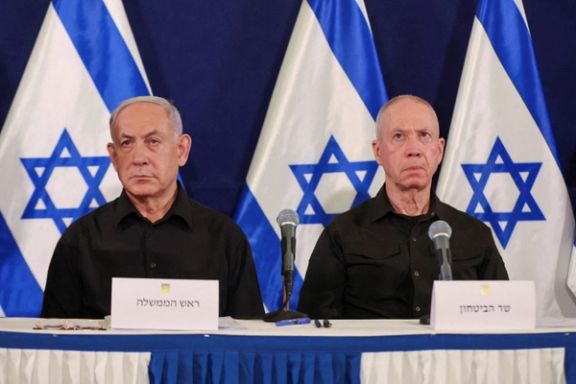
Israel says the war will continue until the eradication of Hamas, underlining that the future of the region and the world depends on the outcome of the conflict.

Israel says the war will continue until the eradication of Hamas, underlining that the future of the region and the world depends on the outcome of the conflict.
Israeli Prime Minister Benjamin Netanyahu, in an exclusive interview with Fox News on Thursday, declared that this is a war between “the entire civilized world and barbarism,” noting that a victory by Iran’s axis of terror -- including Hamas, Hezbollah, and Houthis-- will plunge the region and the world into a dark era.
Admitting that Israel’s retaliatory offensive into Gaza is “taking a little longer than” he had hoped, he highlighted that Israel would not agree to a ceasefire because “our future, the future of our neighbors, the future of Palestinians and the future of the world is related to who wins.”
“Does the axis of terror of Iran, Hezbollah, and Houthis win? Or do the forces of progress and prosperity – Israel, the US, the modern Arab states win?” he said, adding that if “the bad guys” win, “they can cast the Middle East and the entire world into another period of dark ages.”
"A cease-fire with Hamas means surrender to Hamas, surrender to terror and the victory of the Iran's axis of terror, so there won't be a cease-fire without the release of Israeli hostages," he insisted.
"We don't seek to conquer Gaza, we don't seek to occupy Gaza, and we don't seek to govern Gaza," Netanyahu said, adding that “we have to have a credible force that, if necessary, will enter Gaza and kill the killers. Because that's what will prevent the reemergence of a Hamas-like entity.”
Washington has said it would oppose Israeli post-war occupation of Gaza, where Israel has waged a bombing campaign to destroy the enclave's Hamas rulers after militants rampaged through southern Israeli communities on October 7 in an attack that Israel says killed 1,400 mostly civilians.

Undeterred Iran proxies have launched four attacks on American troops the day after US fighter jets struck an IRGC arms depot in Syria.
A Pentagon spokesperson confirmed that three personnel were lightly injured in the attacks, bringing the number of US military injuries to almost 60 in a total of 46 drone and rocket attacks since October 17.
The US airstrike in Syria early hours of Thursday was meant to be a warning shot. US Secretary of Defense Lloyd Austin said in his statement following the operation, “we urge against any escalation."
Iran and its proxies seem to have ignored the message.
Iran’s foreign minister told his Qatari counterpart that “with the intensification of the war on civilians in Gaza, expansion of the scope of the war has now become inevitable.”
Israel's military said a group in Syria launched a drone that hit a school in the southern Israeli city of Eilat on Thursday and that it struck the group in response.
The Israeli military did not say what organization in Syria had launched the drone toward Eilat, on the Red Sea approximately 400 kms (250 miles) from the nearest point in Syrian territory.
But it said in a statement it holds Syria's government fully responsible "for any terror activity emanating from its territory." There were no reports of injuries from the drone strike, which caused light damage.
Iraqi militias have explicitly stated that they will carry on attacking American targets while the US government lends its unconditional support to Israel’s onslaught on Gaza.
And Houthis in Yemen continue to launch missiles at Israel.
US officials say they hold the regime in Iran to be ultimately responsible for all such attacks. But many in Washington seem to believe that the administration’s response is too little, if not too late.
“The Biden administration sends a message of weakness when it refuses to enforce the oil sanctions on Iran,” said Senator John Kennedy to Fox News Thursday. “[They] think if we're just nice guys, that we can be partners with Iran. And we can't.”
Biden’s Iran policy came under attack in the Republican presidential debate Thursday night. All candidates called for tougher actions. Senator Tim Scott was perhaps the one with the harshest comment.
“If you want to make a difference,” he said, “you cannot continue to have strikes in Syria on warehouses, you have to cut off the head of the snake. And the head of the snake is Iran."
Former president Trump, who is running for President again, also weighed in on the subject in an interview Thursday night –blaming it all on the Biden administration.
“This [war] is something that would have never happened with me,” he claimed. “We were actually getting along well with Iran. We would have had a deal with Iran; and they didn’t have the funds to do what they’re doing now… they were broke. There were a lot of problems with Hezbollah… they were all complaining that they’re not getting any money. That was a good thing."
Iranian officials have been warning of a full-scale regional war ever since Israel attacked Gaza in response to Hamas’ unprecedented operation inside Israel that killed 1400.
Yemen's Iran-aligned Houthi movement has also launched repeated missile and drone attacks on Israel since October 7, all of which were either shot down or fell short.
On Thursday, the Houthis, which govern swathes of Yemen including the capital Sanaa, said they fired ballistic missiles at various Israeli targets including what the group's military spokesperson described as military targets in Eilat.
Israel's military said its "Arrow" air defense system intercepted a missile launched at Israeli territory near the Red Sea, and that its Patriot defense system had intercepted a "suspicious target" in the southern Negev desert.
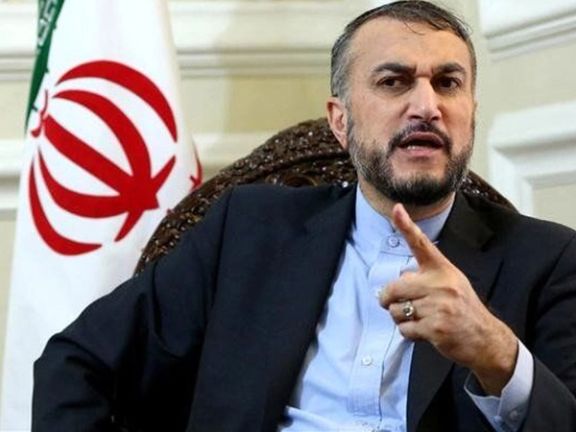
Iran’s foreign minister has reiterated that the continuation of Israel’s retaliatory offensive against Hamas would inevitably lead to an expansion of the conflict.
Hossein Amir-Abdollahian made the comment in a telephone conversation with his Qatari counterpart Sheikh Mohammed Bin Abdulrahman Al Thani on Thursday. The statement could ramp up concerns over whether Washington's diplomatic efforts and deployment of US naval forces to the eastern Mediterranean will be able to keep the conflict from further destabilizing the Middle East.
"Due to the expansion of the intensity of the war against Gaza's civilian residents, expansion of the scope of the war has become inevitable," Amir-Abdollahian said, according to Iranian state media.
Iran has made similar statements in the past four weeks as its ally Hamas has come under attack by Israel but Tehran has chosen not to get directly involved so far.
Hamas-run Ministry of Health said an Israeli strike hit a courtyard in the Al Shifa hospital, causing causalities without providing details. Israel said Hamas has hidden command centers and tunnels beneath Al Shifa, and other hospitals such as the Indonesian Hospital.
"While the world sees neighborhoods with schools, hospitals, scout groups, children’s playgrounds and mosques, Hamas sees an opportunity to exploit," Israel's military said in a statement.
Israel has been pounding the enclave to uproot the Islamist group, which has made the war exceedingly bloody hiding deep among the civilian population and underneath the coastal sliver’s non-military facilities.
Iran supports Hamas but says it did not play any role in the Islamist militants' October 7 terror attack that triggered the current crisis. Iran also backs the Hezbollah, a Lebanese militant group that has deep ties with Hamas and Islamic Jihad, another Palestinian faction in Gaza that is also backed by Iran.
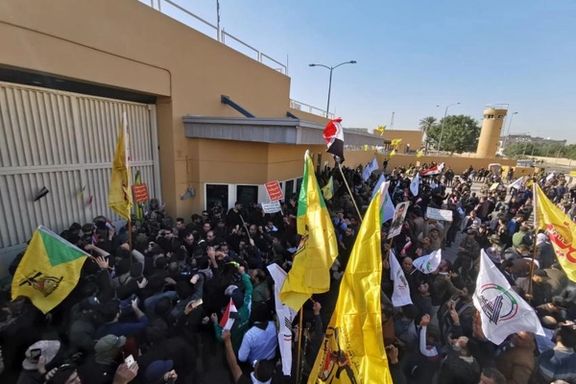
A Pentagon official speaking to Iran International on Thursday, denied an attack on the US embassy in Baghdad, but confirmed that Harir military base in Iraqi Kurdistan was targeted.
The official who requested anonymity said the attack north of Erbil inflicted no damage or casualties. Iran International’s sources in northern Iraq confirmed explosion at Harir base, but there was no information on casualties.
Earlier on Thursday, Iraqi militant groups back by Iran had claimed that they targeted the US embassy in Baghdad and others reported hearing explosion, but the Pentagon official dismissed these claims.
Sine the October 7 terror attack on Israel by Hamas, Iran’s armed proxy groups in the region have targeted US forces in Syria and Iraq more than 40 times. The United States has retaliated twice, bombing weapons storge facilities in Syria belonging to Iran’s Revolutionary Guard and their militia forces. The limited response has failed to deter Iran and its proxies.
Iran’s proxies attacked US forces in the region regularly since 2018, when Washington pulled out of the 2015 nuclear deal and imposed sanctions. These attacks intensified in December 2019 leading to the targeted killing of Qassem Soleimani, Iran’s top operator in the region, by orders of President Donald Trump.
However, in the past one year the attacks subsided apparently because Iran was negotiating with the Biden administration for unblocking billions of dollars of its frozen funds abroad. In June and August, the US agreed to unfreeze more than eight billion dollars blocked in Iraq and South Korea.
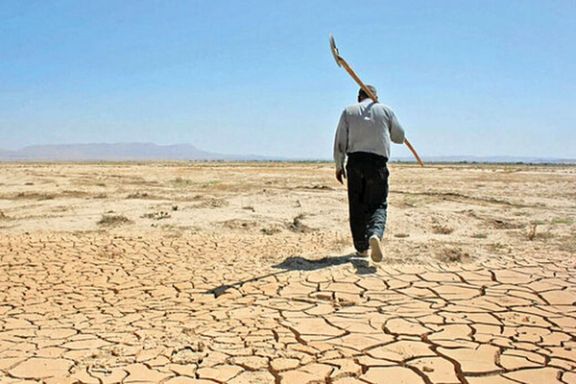
Human-induced climate change including war and urbanization has played a major role in exacerbating a three-year drought in Iran, Iraq, and Syria.
Citing the findings of scientists from Iran, the UK, the US, and the Netherlands, World Weather Attribution reported that the drought spanning 36 months from July 2020 to June 2023, was “the second worst in the observed record.”
According to the report, the drought which affected large parts of Iran and the whole Euphrates and Tigris basin, the two rivers crossing Iraq and Syria, would have been less severe if the world had been 1.2°C cooler.
The consequences of the drought in the region were made even more severe as a result of sociopolitical conflicts, most notably the Ukraine war which heavily influenced food and energy prices, the report added.
The findings of the study maintained that “war and post-war transition, rapid urbanization in the face of limited technical capacity, and regional instability” compounded the negative outcomes of the drought in the region, leading to a humanitarian crisis.
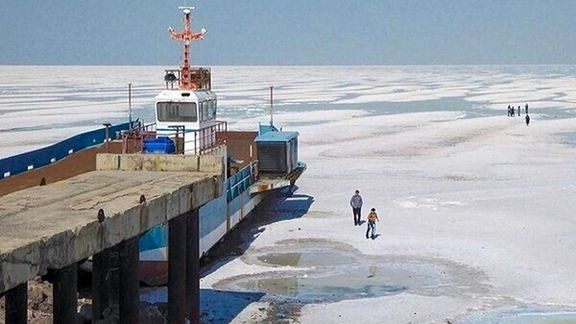
The three-year drought in Iran, Iraq, and Syria was ruinous as the majority of the people in these countries depend on “rain-fed agriculture” to sustain their livelihood, said the report.
World Weather Attribution also warned that under the present climatic situation, it is to be expected that such severe droughts will recur “at least every decade.”
“After quite good rains in 2020 and good harvests, three years of very low rainfalls followed with very high temperatures led to a drought with very severe impacts on agricultural access to potable water,” France24 quoted Friederike Otto, affiliated with Imperial College London, as saying with regard to the three-year drought.
Meanwhile, Mohammad Rahimi, professor of “desert greening” at the University of Semnan, Iran, emphasized the importance of better resource management given increasing temperatures in the region.
“We anticipate that we will have more evaporation and transpiration from the plants so I am not so optimistic for the future,” Rahimi stipulated.
The Iranian regime’s mismanagement of the country’s environment, especially water resources, have garnered harsh criticism from scientists and activists over recent years.
Three months ago, Iranians held a demonstration in the northwestern city of Tabriz to protest mismanagement that has led to the disappearance of Lake Urmia.
In July last year, a rally was held for the same reason and the regime’s security forces arrested several activists.
Located between the provinces of East Azarbaijan and West Azarbaijan in northwestern Iran, Lake Urmia (Orumiyeh) was the largest lake in the Middle East and the sixth-largest saltwater lake on Earth with an original surface area of 5,200 square kilometers in the 1970s, or 2,000 square miles. It had shrunk to 700 sq km by 2013. The lake began shrinking in the 1980s due to water mismanagement and climate change.
Farhikhtegan newspaper reported last year that a quarter of Iran’s farmers have lost their jobs in the past seven years mostly due to lack of water.
Droughts and shortage of water have also lead to soil erosion, desertification, and dust storms in Iran.
Iran's health ministry revealed in July that approximately half of Iran's population is currently facing hazardous dust storms, posing serious risks to people's health.
However, Mohammad-Mehdi Hosseini Hamedani, the Supreme Leader’s representative in the city of Karaj, attributed the low precipitation in Iran to a lack of hijab observance, after many women took off their veils following months of protests.
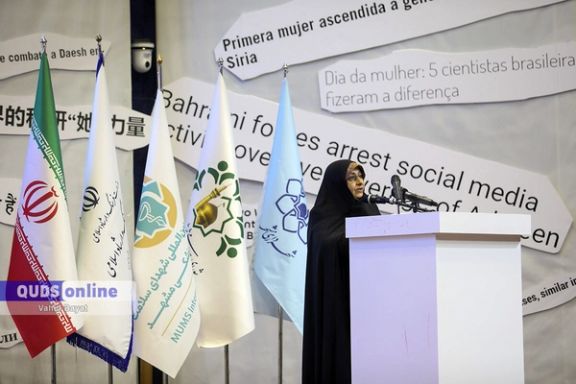
President Ebrahim Raisi's wife, Jamileh Alamolhoda, has once again sparked controversy in Iran due to her public and political activism.
Earlier this week, Ms. Alamolhoda wrote a letter to French President Emmanuelle Macron's wife, Brigitte Macron, urging her to ask her husband to press for cease-fire in the Gaza war.
Politicians and members of the public criticized Ms. Alamolhoda for her ambitions to assume the role of the first lady, although, on previous occasions, she clarified that she is no more than a second lady, as the position of the first lady is reserved for Supreme Leader Khamenei's wife Khojasteh.
In September, Ms. Alamolhoda participated in several interviews with US networks alongside the UN General Assembly and spread disinformation including the claim about Iranian men not being happy with their wife going to work. Many men and women objected, explaining that it is hardly possible to make ends meet if both spouses do not go to work to earn a living.
Despite the criticisms, which at least on one occasion came from Khamenei's office, cautioning Raisi to curb his wife's political ambitions and her intervention state affairs, Jamileh Alamolhoda does not seem to have been shaken by the criticisms.
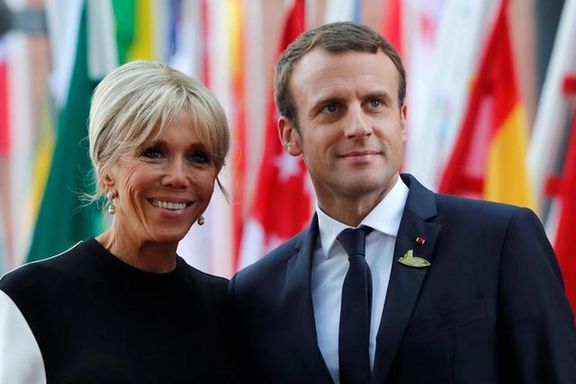
After she was criticized for writing to Ms. Macron, Jamileh insisted that she was writing to 40 other European first ladies, although obviously Europe cannot have that many first ladies.
Earlier this year she created another controversy by sponsoring a conference of "accomplished women" some of whom no one knew and others found out hard to explain their accomplishments.
Ms. Almolhoda has been accused by Iranian politicians for using non-diplomatic expressions in her letter to Ms. Macron. She wrote: "Dear Ms. Macron! Please, as a kind and self-sacrificing woman who represents the women, mothers and daughters of France, ask your husband not to be an accomplice in murdering helpless Palestinian children and women. I wish you reward from God for your humanitarian efforts."
She wrote the letter without knowing that Macron's wife accompanied him during the visit to Israel to express support for the government. Critics asked whether the Iranian Foreign Ministry knew about the letter at a time Iran needs stronger diplomacy.
Some at the President's Office in Tehran have told Khabar Online that writing the letters was Ms. Alamolhoda's independent activity and had nothing to do with the government.
Earlier, conservative commentator Mohammad Mohajeri wrote that some cabinet members felt humiliated when they found out that they needed to go and see Ms. Alamolhoda to brief her on their activities. He reminded Raisi that "great men", possibly alluding to Khamenei, told you beforehand to stop that kind of behavior.
A cleric by the name of Jalil Mohebbi, wrote just once sentence to Raisi in a tweet: "Stop your wife!" Later, he was probably forced to change his tone and write a formal letter to Ms. Alamolhoda and President Raisi on social media.
Conservative cleric Abbas Ali Amiri wrote in a tweet addressed to Ms. Alamolhoda: "If you accept the title of the first lady, you should also accept concepts such as secularism, pluralism, liberalism and so on."
Former President Mahmoud Ahmadinejad's aide, Abdolreza Davari, also wrote in a tweet that what she did was non-diplomatic and disrespectful to the regime and Supreme Leader. She also accused Ms. Alamolhoda of doing all this because she has an ambition to be called "first lady."
On the other hand, official news agency chief, Ali Naderi, claimed that Ms. Alomolhoda's letter was effective, and Macron has called for a cease-fire. Iranian journalist Ehsan Bodaghi wrote in a tweet that if Naderi had checked his own agency's output, he would have found out that Macron called for a cease-fire several weeks ago.
Iranian media argued that the role of the first lady is clearly defined in the laws of foreign countries, and there are official protocols for what they can and cannot do. However, in Iran, there is no such person as the first lady and the country's former presidents including Khamenei himself understood this very well. What Raisi thinks about the matter is another story. His office never answers questions. However, individuals close to him have insisted that Ms. Alamolhoda's activities are independent of her husband's role.
In other words, either Raisi cannot prevent his wife from intervention in state affairs, or he agrees with what his wife does, but does not feel the need to explain that to others.
Some media outlets such as Khabar Online have suggested that if Ms. Alamolhoda is so keen to continue her activism, she had better establish a political and ensure that, as President's wife, what she does will not disrupt the consistency between the president office's policies and those of the political system as a whole.